Doctors for Erectile Dysfunction: Which Doctor to consult?
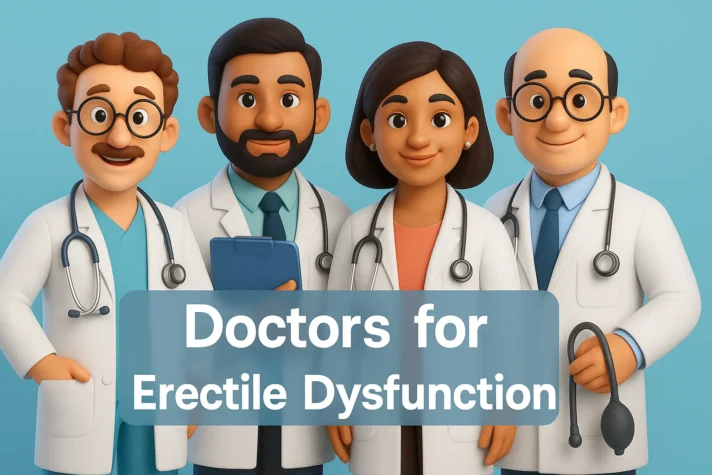
If you're experiencing erectile dysfunction (ED), choosing the right doctor is crucial for effective treatment. Start with a general physician who can assess your overall health and conduct basic tests to rule out conditions like diabetes or low testosterone. If the issue seems physical, a urologist specializes in ED related to blood flow, nerve damage, or structural problems. For hormone-related ED, an endocrinologist can evaluate and treat hormonal imbalances. If psychological factors like stress or anxiety are at play, consider seeing a psychiatrist, psychologist, or sex therapist. Early consultation with the right specialist can significantly improve treatment outcomes.
Erectile dysfunction (ED) affects millions of men worldwide, yet many struggle with which doctor to consult for erectile dysfunction. The confusion is understandable. ED can come from physical health issues, psychological factors, or a combination of both.
Choosing the right doctor for erectile dysfunction depends on your specific symptoms and underlying causes. Whether you’re dealing with stress-related performance anxiety, hormonal imbalances, or heart issues (cardiovascular issues), different erectile dysfunction experts specialize in various aspects of male sexual health.
This comprehensive guide will walk you through the different types of specialists who treat ED, when to seek medical help, and how to choose the right expert based on your symptoms. From urologists and endocrinologists to therapists and primary care physicians, we’ll help you find the most suitable path forward for your specific situation.
When Should You See a Doctor for ED?
Occasional erectile issues can happen due to stress, fatigue, or even a heavy meal. But if symptoms become persistent, worsen over time, or start affecting your confidence and relationships, it’s time to seek professional help.
Based on our clinical data at Allo Health, we’ve observed that men who seek treatment early show significantly better outcomes. Here are key signs that ED needs medical attention:
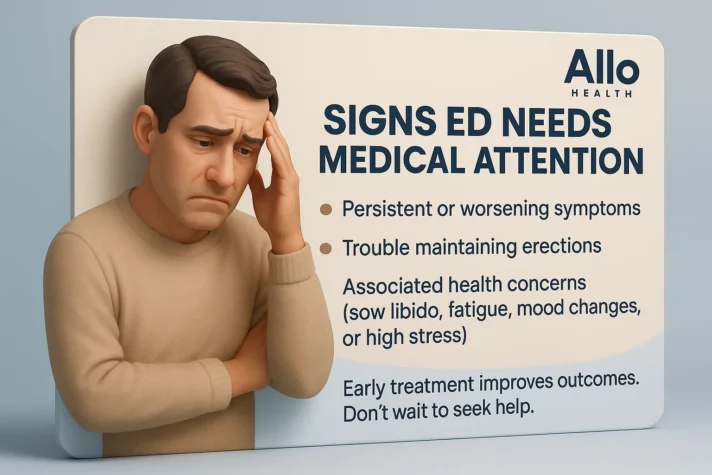
- Persistent or worsening symptoms: If erectile issues are consistent over several weeks or months, it could indicate an underlying health issue that needs addressing.
- Trouble maintaining erections: Getting an erection but struggling to keep it firm enough for penetration or completion is a common concern that warrants evaluation.
- Associated health concerns: Symptoms like low libido, fatigue, mood changes, or high stress levels may point to hormonal imbalances or psychological factors contributing to ED.
Ignoring ED can delay diagnosis of more serious issues like diabetes, high blood pressure, low testosterone, or mental health disorders. The earlier you talk to a healthcare provider, the sooner you can start treatment and regain control over your sexual health and confidence.
Types of Doctors Who Treat Erectile Dysfunction
Since many causes may lead to erectile dysfunction, choosing the right specialist is essential. Let’s explore the different doctors for erectile dysfunction and their areas of expertise.
1. General Physician (Your First Stop) for ED
A primary care doctor can perform an initial assessment if you’re experiencing ED. They’ll start by asking about your medical history, lifestyle, and symptoms. They may also conduct blood tests to check for underlying health issues like diabetes[1], high cholesterol [2], or low testosterone[3].
If the doctor identifies a clear issue, they may prescribe basic medications like PDE5 inhibitors to improve blood flow to the penis.
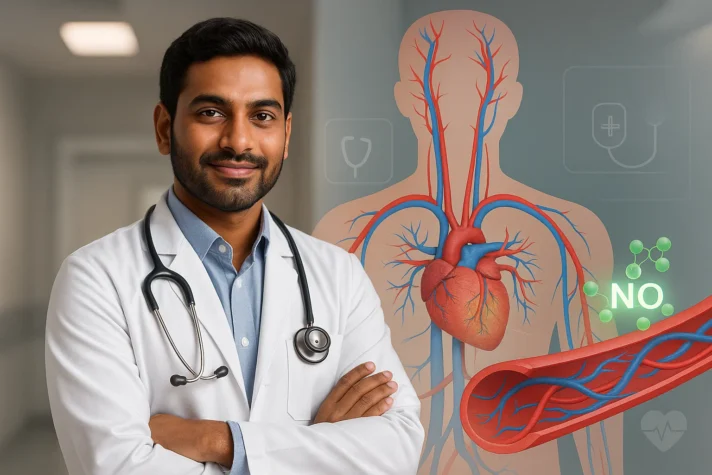
However, if the ED is linked to more complex causes, your primary care doctor will likely refer you to a specialist for further evaluation and treatment.
2. Urologist (The Primary ED Specialist)
A urologist is a medical doctor and surgeon who specializes in diagnosing and treating conditions related to the urinary and reproductive systems. They are often considered the best doctors for erectile dysfunction when physical causes are anticipated.
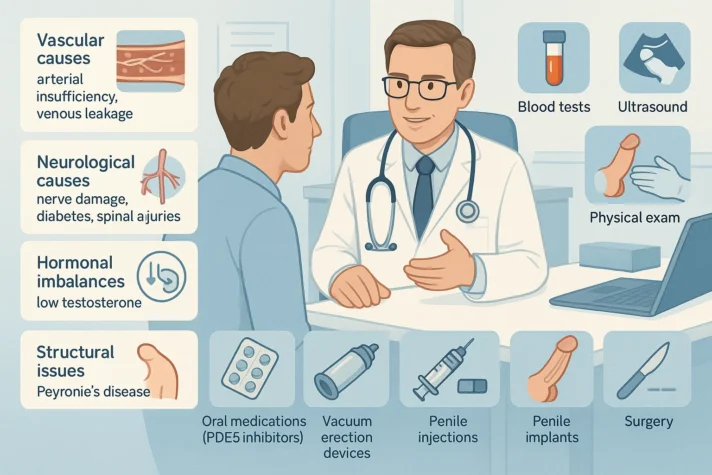
Why Urologists Are ED Experts:
The urinary system and reproductive organs are closely linked in men. The urethra carries both urine and semen. The penis serves both urinary and reproductive functions. The prostate gland affects both urinary function and sexual health.
Urologists understand both systems, making them qualified to treat ED, especially when it’s linked to structural, vascular, or nerve-related issues.
Vascular Causes of ED:
Urologists diagnose vascular issues affecting blood flow to the penis, which is a common cause of ED. These issues include:
- Arterial insufficiency: Reduced blood flow through arteries, often due to narrowing or blockage[4]
- Venous leakage: When the penis veins cannot retain enough blood to maintain an erection[5]
- Atherosclerosis: Plaque buildup in arteries[6]
Using tools like ultrasound or angiography, urologists can identify these problems and suggest treatments like medications, vascular surgery, or penile implants.
Neurological Causes:
Nerve damage from conditions like diabetes, spinal cord injuries, prostate surgery, or other nerve problems is another common cause of ED. Urologists are experts in treating these nerve issues that affect erections.
Hormonal Imbalances:
Testosterone levels play a critical role in erectile function. If there is a hormonal imbalance, such as low testosterone, a urologist may recommend hormone tests and treatments like testosterone replacement therapy.
Structural Issues:
Urologists can diagnose structural abnormalities in the penis that may contribute to ED. Conditions like Peyronie’s disease, which causes abnormal curvature of the penis, can result in painful erections or erectile dysfunction.
How Urologists Diagnose and Treat ED:
Comprehensive History and Physical Exam: The first step is a thorough medical history and physical examination. A urologist will ask about lifestyle habits, medications, underlying health conditions, and sexual history.
Blood Tests: A urologist might recommend blood tests to check for diabetes, hormonal imbalances, high cholesterol, or liver and kidney function.[7]
Urinalysis: May be done to check for signs of kidney disease, diabetes, or other urinary tract problems that might affect sexual function.[8]
Ultrasound: If vascular issues are suspected, they may use duplex ultrasound to visualize blood flow in the penile arteries.[9]
Treatment Options:
- Oral Medications: PDE5 inhibitors (Viagra, Cialis, Levitra) are often the first-line treatment
- Vacuum Erection Devices: Help increase blood flow into the penis
- Penile Injections: Medications are injected directly into the penis to induce an erection
- Penile Implants: A permanent solution for cases where other treatments have failed
- Surgery: For structural issues like Peyronie’s disease
3. Andrologist (Male Sexual Health Specialist)
An andrologist is a sub-specialist of urology focused on male fertility and sexual dysfunction. They are medical specialists who focus specifically on men’s reproductive health.

If your urologist has examined you and feels there are issues involving fertility and testosterone concerns, they can refer you to an andrologist. These specialists are trained in treating fertility issues and testosterone concerns that may contribute to ED.
4. Endocrinologist (Hormonal Specialist)
The endocrine system relates to hormones and glands. An endocrinologist deals with hormone and gland-related issues.
Erections in men are directly related to testosterone, the primary male sex hormone. As observed in over 250,000+ patient consultations at Allo Health, hormonal imbalances are a significant factor in ED cases.
When ED is linked to diabetes, obesity, thyroid issues, or low testosterone, an endocrinologist becomes important. These conditions are all due to the malfunctioning of hormones and glands.
An endocrinologist can evaluate and treat hormone-related issues perfectly, making them essential erectile dysfunction experts for hormone-related cases.
5. Psychiatrist, Psychologist, or Sex Therapist
When erectile dysfunction is caused by psychological or emotional issues, these specialists become essential.
In our consultations at Allo Health, we’ve found that:
- 38% of ED patients have never spoken to their partners about it
- 24% had performance anxiety as the main trigger
- Over 40% showed anxiety-related symptoms as contributing factors
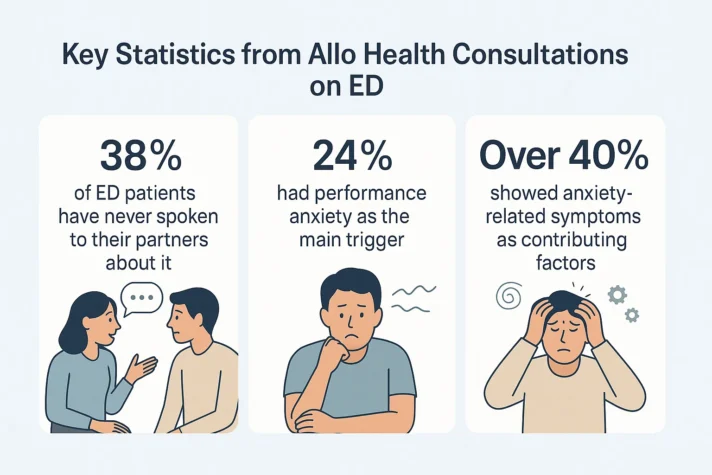
These specialists can help address mental health factors such as:
- Performance anxiety: Worrying about sexual performance
- Depression: Feeling low or uninterested in sex
- Stress: Work, family, or personal pressures
- Trauma: Emotional scars from past experiences
- Relationship problems: Issues with a partner affecting intimacy
The therapist may ask you to fill out questionnaires to understand if conditions like anxiety, depression, or other mental health issues are contributing to your ED. They may suggest lifestyle changes, communication with your partner, or coping strategies to help both your mental well-being and ED.
At Allo Health, we’ve seen that a combined approach treating both the mind and body often works best when it comes to overcoming ED.
How to Choose the Right Specialist for You for ED
If you’re unsure who to consult for erectile dysfunction, you can start by doing a self-assessment:
- Physical symptoms: If you have health conditions like diabetes, heart disease, or low testosterone, or if you notice changes in your overall health, the cause might be physical.
- Psychological triggers: If you’re feeling stressed, anxious, or dealing with relationship issues, the cause might be mental or emotional.
If you’re not sure, the best first step is to see a General Practitioner. They can do a basic check-up and blood tests to rule out physical causes.
A multidisciplinary approach often works best for ED. This means working with both a urologist (for physical problems) and a psychologist (for emotional or relationship issues). By addressing both the physical and emotional sides, you’re more likely to get effective treatment.
Where to Find Help: Online and In-Person Options for ED
If you’re dealing with ED, you have several ways to seek help, both online and in person.
Teleconsultation is a convenient and private option that has become famous recently, allowing you to speak with healthcare professionals like urologists or psychologists from the comfort of your home. Many platforms offer confidential consultations, which are ideal for initial assessments and ongoing support.
Allo Health, India’s first dedicated sexual health clinic. Allo Health provides personalized, discreet, and judgment-free care, offering treatments for ED, low testosterone, fertility issues, and more. Through teleconsultations, you can access expert advice from the privacy of your home. They also offer in-person visits for those who prefer face-to-face consultations.
Whether online or in person, Allo Health focuses on confidential, holistic care, making it a great option for men seeking effective treatment and a supportive environment.
"The following blog article provides general information and insights on various topics. However, it is important to note that the information presented is not intended as professional advice in any specific field or area. The content of this blog is for general educational and informational purposes only.
Book consultation
The content should not be interpreted as endorsement, recommendation, or guarantee of any product, service, or information mentioned. Readers are solely responsible for the decisions and actions they take based on the information provided in this blog. It is essential to exercise individual judgment, critical thinking, and personal responsibility when applying or implementing any information or suggestions discussed in the blog."






